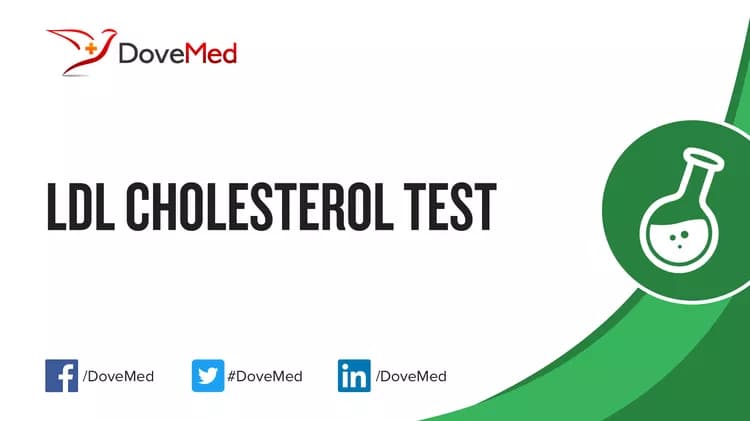What are the other Names for this Test? (Equivalent Terms)
- LDL-C Test
- Low-Density Lipoprotein Cholesterol Test
What is LDL Cholesterol Test? (Background Information)
- Cholesterol is a kind of fatty substance that plays an important role in the human body. The body is capable of producing cholesterol and some of it is obtained from the diet
- Some of the cholesterol circulates in blood as part of a particle, called lipoprotein (compounds made of proteins and fatty substances, such as cholesterol, triglycerides, and phospholipids)
These lipoproteins are classified based on their densities into:
- High-density lipoproteins (HDL)
- Low-density lipoproteins (LDL)
- Very low-density lipoproteins (VLDL)
Amongst these, HDL is otherwise termed as “good cholesterol”, while LDL is referred to as the “bad cholesterol”. This is because HDL carries cholesterol from the tissues to the liver for disposal, whereas LDL deposits it into the coronary arteries and other arterial blood vessels, resulting in coronary artery disease and atherosclerosis of large vessels.
- Low-density lipoprotein cholesterol (LDL-C) constitutes half of the total lipoprotein, present in human plasma
- It is produced through metabolism of very low-density lipoprotein (VLDL) and consists of 50% cholesterol and 25% apoB-100 protein. One-fifth consists of possible lipids
The LDL cholesterol is part of a complete lipid profile. The complete profile consists of high density protein cholesterol, triglycerides, and total cholesterol.
- LDL is measured using a special calculation, which is fairly accurate
- In scenarios where triglyceride levels are high, the special calculation does not work well, resulting in false LDL levels
- In clinical scenarios, where triglyceride levels are high, then a direct measurement of LDL is performed, especially on a non-fasting sample
- Direct LDL level measurements are more expensive, than estimated LDL levels, through calculation (indirect method)
There are two varieties of LDL particles: Pattern A LDL particles and pattern B LDL particles
- Pattern A LDL particles are generally larger and less dense, than pattern B LDL particles, which are smaller and have a higher density
- Studies have shown that pattern B type of LDL particles correlate with a higher risk for coronary artery disease than pattern A LDL particles
What are the Clinical Indications for performing the LDL Cholesterol Test?
LDL cholesterol is an integral part of a lipid profile, which consists of total cholesterol, HDL, triglycerides, and LDL.
- The lipid profile is ordered to assess the risk for cardiac disease. It is usually not performed in children, unless they are at an increased risk of developing heart disease, such as by being overweight, having type-1 diabetes, or with a family history of heart disease
- LDL can also be ordered to monitor the response of treatment, or lifestyle changes initiated to lower LDL cholesterol
How is the Specimen Collected for LDL Cholesterol Test?
Sample required: Blood
Process: Insertion of needle into superficial vein of the arm.
Preparation required: Generally, 12-hour fasting is necessary, prior to performing a lipid profile.
What is the Significance of the LDL Cholesterol Test Result?
The American Heart Association, National Cholesterol Education Program, and National Institute of Health, have provided guidelines for fasting LDL cholesterol levels. These are as follows:
- 25 - 100 mg/dl indicates an optimal LDL cholesterol level
- 100 - 129 mg/dl indicates a near optimal LDL level, which corresponds to a higher rate of developing symptomatic cardiovascular diseases
- 130 - 159 mg/dl indicates a borderline high LDL level, which corresponds to a high rate of developing symptomatic cardiovascular diseases
- 160 - 199 mg/dl corresponds to a high LDL level resulting in a much higher rate of developing symptomatic cardiovascular diseases
- > 200 mg/dl indicates a very high LDL level, which corresponds to highly increased rates of symptomatic cardiovascular diseases
Increased levels of LDL cholesterol indicate an elevated risk of heart disease.
The laboratory test results are NOT to be interpreted as results of a "stand-alone" test. The test results have to be interpreted after correlating with suitable clinical findings and additional supplemental tests/information. Your healthcare providers will explain the meaning of your tests results, based on the overall clinical scenario.
Additional and Relevant Useful Information:
- A lipid profile should not be performed, if the individual is suffering from an illness. A lipid profile performed during illnesses may result in falsely low LDL cholesterol levels
- LDL cholesterol levels should also not be performed following major surgeries or acute episode of heart attack
- During pregnancy, there is an increase in LDL levels; hence, women needing a lipid profile should wait at least 6-weeks post-delivery, for an accurate estimation of LDL cholesterol
There are a variety of risk factors causing increased risk for cardiovascular diseases. These factors include:
- Elevated LDL cholesterol (bad cholesterol)
- Low HDL cholesterol (good cholesterol), especially < 40 mg/dl
- Males older than 45 years, females older than 55 years
- Cigarette smoking
- Increased blood pressure
- Family history of early heart disease
- Type 1 & Type 2 diabetes mellitus
Certain medications that you may be currently taking may influence the outcome of the test. Hence, it is important to inform your healthcare provider, the complete list of medications (including any herbal supplements) you are currently taking. This will help the healthcare provider interpret your test results more accurately and avoid unnecessary chances of a misdiagnosis.
Related Articles
Test Your Knowledge
Asked by users
Related Centers
Related Specialties
Related Physicians
Related Procedures
Related Resources
Join DoveHubs
and connect with fellow professionals


0 Comments
Please log in to post a comment.